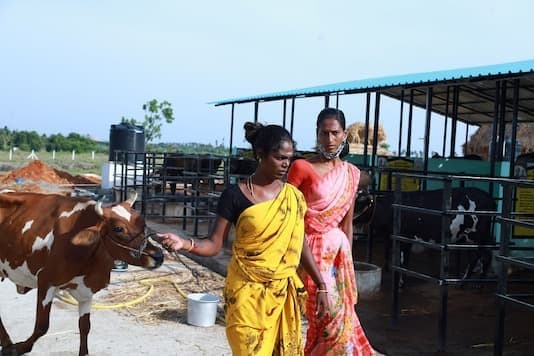
‘I Feel I Belong’: India’s First Trans-run Dairy Farm Brings Jobs And Respect
As head of India’s first dairy farm run by transgender women, Bhoomika has finally found security, having spent years as a beggar after fleeing parents who taunted their sari-wearing son. The state-backed Transgenders’ Milk Producers’ Cooperative Society officially opened its doors in the southern Indian state of Tamil Nadu last month, providing 30 trans women each with an individual home, a cow and a shared business venture. “I begged on the trains for five years. Life was difficult, everyone looked at us in a strange way,” Bhoomika, who goes by one name, told the Thomson Reuters Foundation by phone.
“We are still treated the same outside the dairy farm but inside I am able to lead a normal life, a life of dignity. I feel I belong,” the 28-year-old said from the farm in Manthithoppu village, about 100 km south of Madurai city. The 1.5-acre farm, which sells 180 litres of milk a day, was the brainchild of local official Sandeep Nanduri, who tapped multiple state departments for housing, jobs, training and cash to realise the 17.5 million-rupee ($237,621) project.
It is rare for India’s estimated 2 million trans population to find stable homes or incomes, with many forced to beg, dance at weddings or sell sex in the face of widespread discrimination that makes it hard to access education and jobs. Since India’s Supreme Court gave trans people “third gender” recognition in 2014, a growing number of companies have actively hired trans people and adopted more inclusive policies, such as unisex toilets.
Trans people have also received charity and local government funding to start businesses such as take-out biryani rice joints or tattoo parlours, according to local media. But Nanduri had greater ambitions. “In the last couple of years, we have helped some trans people with loans to set up small shops but the idea this time was to empower the community not just financially, but to make them entrepreneurs,” he said. “They face social exclusion so we kept the farm close to their residential space,” said Nanduri, the administrative head of Thoothukudi district.
DIGNITY
Nanduri was spurred into action by a well-known trans activist Grace Banu who had been lobbying local officials for six years – without success – to provide housing for trans women in the port city of Thoothukudi, where she grew up. Unlike most trans women in India, Banu earned an engineering degree and now works as a mobile app developer in Chennai, and is a leader in the trans community. “Housing is our biggest problem. If we rent homes, the owners treat us poorly and if we speak up, they ask us to vacate the house with no notice,” said Banu.
In just over a year, Nanduri arranged loans for the women to buy cows and enlisted government agencies that taught them how to farm and built cattle sheds on the site, along with neat rows of green and turquoise, one-room homes.
“He was the first person to treat us with respect, he put in all the effort to meet our demand,” said Banu. “That is why we named our housing colony after him. We call it Sandeep Nagar,” she said. The term nagar is often used to denote a town in India. The women are paid by the litre and earn about 8,000 rupees ($109) each per month supplying milk to Tamil Nadu’s biggest milk producers’ union Aavin, which buys from about 170 farms in Thoothukudi. “They are doing well compared to other dairies as they work as a community … they are attached emotionally and live together as a family,” said Santha Kumar, manager with Aavin’s procurement department.
“The fat content is 4.1%, better than the average fat content of 3.9% fat that we get, which means the cattle is being fed well and the quality of milk is good.” Bhoomika is confident the farm will continue to flourish, with plans afoot to add more cows and members. When a local villager offered to buy her cow, she refused. “This business has given us dignity,” she said. “We have been trusted with this work and we don’t want to break that.”
Read: Assam Cabinet Announces Funding for Gaushalas to Feed Cows
Source: The article is extracted from NEWS 18, October 27, 2020.
